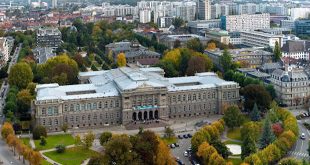Middle East and Islamic Studies (MEIS) faculty are drawn from the Departments of Anthropology, Comparative Literature, Hispanic Studies, History, Media and Cultural Studies, Religious Studies, Theatre, Political Science, and Women’s Studies.
About
The major and minor in Middle East and Islamic Studies offer a broad course of interdisciplinary and theoretically informed study. It is designed to provide a broad understanding of the history, politics and culture of the Middle East and Muslim societies. The coursework introduces students to the complexity and diversity of the cultural and geographic regions that are represented in the Middle East and Islamic world with focuses on gender, history, religion, literature, popular discourses and politics.
Middle East and Islamic Studies (MEIS) faculty are drawn from the Departments of Anthropology, Comparative Literature, Hispanic Studies, History, Media and Cultural Studies, Religious Studies, Theatre, Political Science, and Women’s Studies. Their research and expertise canvass a vast and diverse area from Muslim Spain to Ottoman Greece, and North Africa, in the west, to Central Asia, Indonesia, and South Asia, in the east. Thematically, MEIS faculty examine such issues as social, economic, urban, gender and legal history; Arabic language and literature; identity politics; media in India; theatre and representation; literary studies; state, society and religion; gender and modernity; Islamic movements; human rights; transnationality; and pluralism.
Middle East and Islamic Studies (MEIS) also attends to these themes in relation to language proficiency, broad information literacy, critical analysis, theoretical questions, research and writing skills, which the study of “regions” or “cultural areas” requires. Do they have historical knowledge, analysis and reading skills (primary and secondary sources)? What are the terms through which, an understanding of a “region” or “area” are articulated? How are such domains defined and what are the histories and politics, which have occasioned their formation? How does critical attention to these questions give way to new pedagogical and research objects? And, finally, how do these new objects come to be newly and differently articulated through the experience and lives of our students and their writing? A good number of our survey and upper division courses allow students to participate in interactive learning by taking part in these debates through oral communication and classroom presentations.
Requirements
The DE in Middle East and Islamic Studies offers two tracks, one with a requirement for proficiency in a revelant language (Arabic, Persian, Turkish, Hebrew, Urdu or another language, with the approval of the chair of the DE), and/or a placement test and a second track without a language requirement.
Track One 12 units plus language proficiency (4-6 quarters)
Three (3) courses (12 units) selected from the list below, at least one of which must be outside of the student’s Ph.D. department, plus the completion of four (4-6) quarters of language study, as described above.
Track Two 16 units
Three (4) courses (16 units) selected from the list below, at least one of which must be outside of the student’s Ph.D. department.
In both tracks, the student is required to take a 2 quarter graduate seminar with the prior approval of faculty member in the relevant discipline. It is understood that the second quarter would be devoted to substantial research and writing.
Graduate Seminars Currently on the Books
CWPA 256 Contemporary Literature of the Middle East
CWPA 257 The Sufis
HIST 277 Approaches to the Early Modern World: The Ottoman Empire and Europe
HIST 278 Early Modern Empires, The Ottomans and the Safavids
RLST 200 A Religion, Politics, and Public Discourse
RLST 200 C Religions in Contact
RLST 249 Public Religious Discourses in Modern Islam
RLST 250 Approaches to Islam in Religious Studies
Petitionable Graduate Seminars
CPLT 215B Issues in Contemporary Theory
CPLT 284 Literature, Colonialism, Religion
RLST 200A Religion, Politics, and Public Discourse
SPN 251 Seminar in the Literature of the Middle Ages and Early Renaissance
SPN 279 Studies in Spanish Literature and Culture
Upper Division Undergraduate Courses on the Books
ANTH 136/SEAS 136 Anthropological Perspectives on Gender in Southeast Asia
ANTH 169/GBST 169 From the Maghreb to the Middle East
ARLC 120 Classical Arabic Literary Prose
ARLC 151/CPLT 151 Palestine/Algeria
ARLC 152/CPLT 152 Modern Arabic Poetry in a Multilingual Frame
ARLC 154/CPLT 154/PHIL154 Introduction to Arabic Philosophy
ARLC 155/RLST 157 Introduction to Arabic Literature
ARLC 156/CPLT 156/RLST 156 Jews and Arabs
ARLC 158/CPLT 158/RLST 158 Islam and Psychoanalysis
HIST 121 Survey of Middle Eastern History, 1200-1800
HIST 124 Women in Middle Eastern-Islamic History;
HIST 125 Islam & Revolution in Iran
HIST 126 Istanbul in History and Fiction
MCS 172 Politics of Representations – Images from
the Islamic Worlds
POSC 133 Politics of Central Asia in Comparative Perspective
POSC 152 Politics of the Middle East
POSC 156 Political Systems across Muslim Societies
RLST 111 Islam
RLST 113 Topics in Modern Islam
RLST 116 Religion and Violence
RLST 149 Southeast Asian Religions
RLST150 Islam in Southeast Asia
RLST 151 Reading the Qur’an
RLST 155/PHIL 155 Peace in the Middle East
WMST 151 Islam, Women, and the State
WMST 162 Women’s Issues in Modern Muslim Thought
WMST 168 Gender and Power in Muslim Societies
THEA 191J Staging the Middle East
Contact the Center
Address: University of California, Riverside
900 University Ave.
Riverside, CA 92521
Tel: (951) 827-1012
Website: middleeastandislamicstudies.ucr.edu
 Ijtihad Network Being Wise and Faithful Muslim in the Contemporary World
Ijtihad Network Being Wise and Faithful Muslim in the Contemporary World
